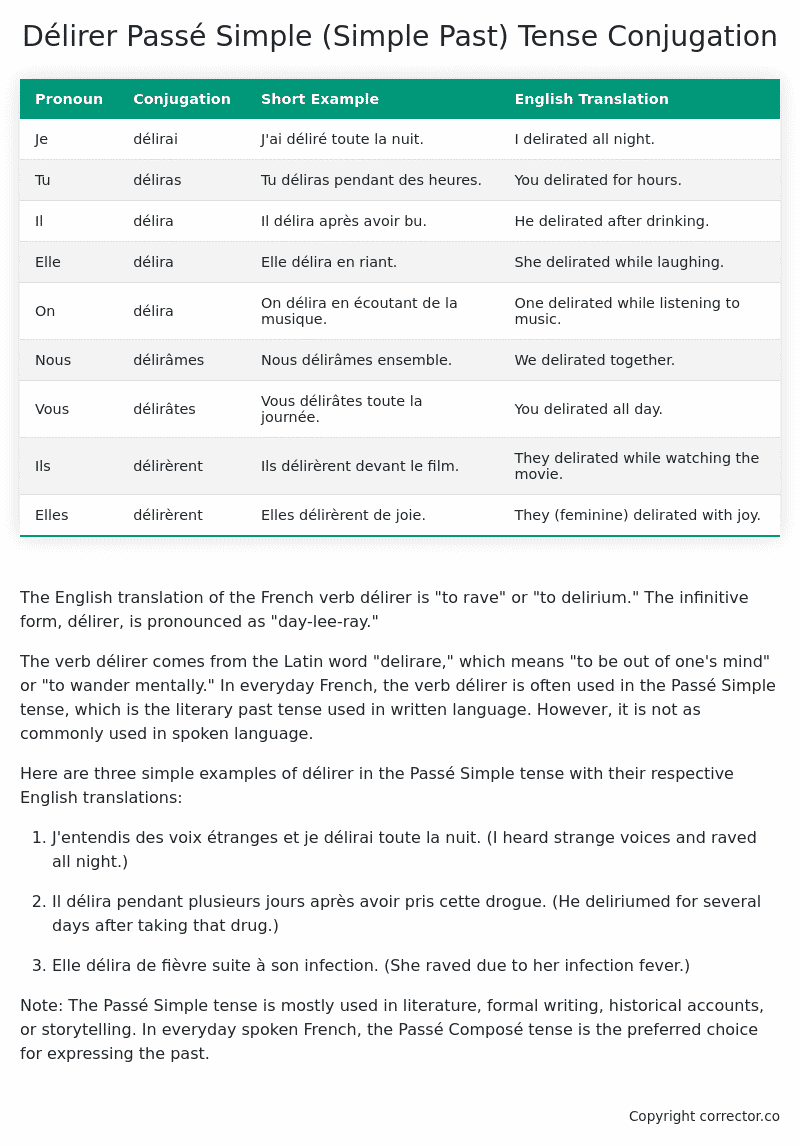Passé Simple (Simple Past) Tense Conjugation of the French Verb délirer
Introduction to the verb délirer
The English translation of the French verb délirer is “to rave” or “to delirium.” The infinitive form, délirer, is pronounced as “day-lee-ray.”
The verb délirer comes from the Latin word “delirare,” which means “to be out of one’s mind” or “to wander mentally.” In everyday French, the verb délirer is often used in the Passé Simple tense, which is the literary past tense used in written language. However, it is not as commonly used in spoken language.
Here are three simple examples of délirer in the Passé Simple tense with their respective English translations:
-
J’entendis des voix étranges et je délirai toute la nuit.
(I heard strange voices and raved all night.) -
Il délira pendant plusieurs jours après avoir pris cette drogue.
(He deliriumed for several days after taking that drug.) -
Elle délira de fièvre suite à son infection.
(She raved due to her infection fever.)
Note: The Passé Simple tense is mostly used in literature, formal writing, historical accounts, or storytelling. In everyday spoken French, the Passé Composé tense is the preferred choice for expressing the past.
Table of the Passé Simple (Simple Past) Tense Conjugation of délirer
| Pronoun | Conjugation | Short Example | English Translation |
|---|---|---|---|
| Je | délirai | J’ai déliré toute la nuit. | I delirated all night. |
| Tu | déliras | Tu déliras pendant des heures. | You delirated for hours. |
| Il | délira | Il délira après avoir bu. | He delirated after drinking. |
| Elle | délira | Elle délira en riant. | She delirated while laughing. |
| On | délira | On délira en écoutant de la musique. | One delirated while listening to music. |
| Nous | délirâmes | Nous délirâmes ensemble. | We delirated together. |
| Vous | délirâtes | Vous délirâtes toute la journée. | You delirated all day. |
| Ils | délirèrent | Ils délirèrent devant le film. | They delirated while watching the movie. |
| Elles | délirèrent | Elles délirèrent de joie. | They (feminine) delirated with joy. |
Other Conjugations for Délirer.
Le Present (Present Tense) Conjugation of the French Verb délirer
Imparfait (Imperfect) Tense Conjugation of the French Verb délirer
Passé Simple (Simple Past) Tense Conjugation of the French Verb délirer (You’re reading it right now!)
Passé Composé (Present Perfect) Tense Conjugation of the French Verb délirer
Futur Simple (Simple Future) Tense Conjugation of the French Verb délirer
Futur Proche (Near Future) Tense Conjugation of the French Verb délirer
Plus-que-parfait (Pluperfect) Tense Conjugation of the French Verb délirer
Passé Antérieur (Past Anterior) Tense Conjugation of the French Verb délirer
Futur Antérieur (Future Anterior) Tense Conjugation of the French Verb délirer
Subjonctif Présent (Subjunctive Present) Tense Conjugation of the French Verb délirer
Subjonctif Passé (Subjunctive Past) Tense Conjugation of the French Verb délirer
Subjonctif Imparfait (Subjunctive Imperfect) Tense Conjugation of the French Verb délirer
Subjonctif Plus-que-parfait (Subjunctive Pluperfect) Tense Conjugation of the French Verb délirer
Conditionnel Présent (Conditional Present) Tense Conjugation of the French Verb délirer
Conditionnel Passé (Conditional Past) Tense Conjugation of the French Verb délirer
Conditionnel Passé II (Conditional Past II) Tense Conjugation of the French Verb délirer
L’impératif Présent (Imperative Present) Tense Conjugation of the French Verb délirer
L’impératif Passé (Imperative Past) Tense Conjugation of the French Verb délirer
L’infinitif Présent (Infinitive Present) Tense Conjugation of the French Verb délirer
L’infinitif Passé (Infinitive Past) Tense Conjugation of the French Verb délirer
Le Participe Présent (Present Participle) Tense Conjugation of the French Verb délirer
Le Participe Passé (Past Participle) Tense Conjugation of the French Verb délirer
Struggling with French verbs or the language in general? Why not use our free French Grammar Checker – no registration required!
Get a FREE Download Study Sheet of this Conjugation 🔥
Simply right click the image below, click “save image” and get your free reference for the délirer Passé Simple tense conjugation!

Délirer – About the French Passé Simple (Simple Past) Tense
Formation
Usage
Narration
Historical Context
Interactions with other tenses
Passé Composé
Imparfait
Conditional and Subjunctive
Summary
I hope you enjoyed this article on the verb délirer. Still in a learning mood? Check out another TOTALLY random French verb conjugation!


